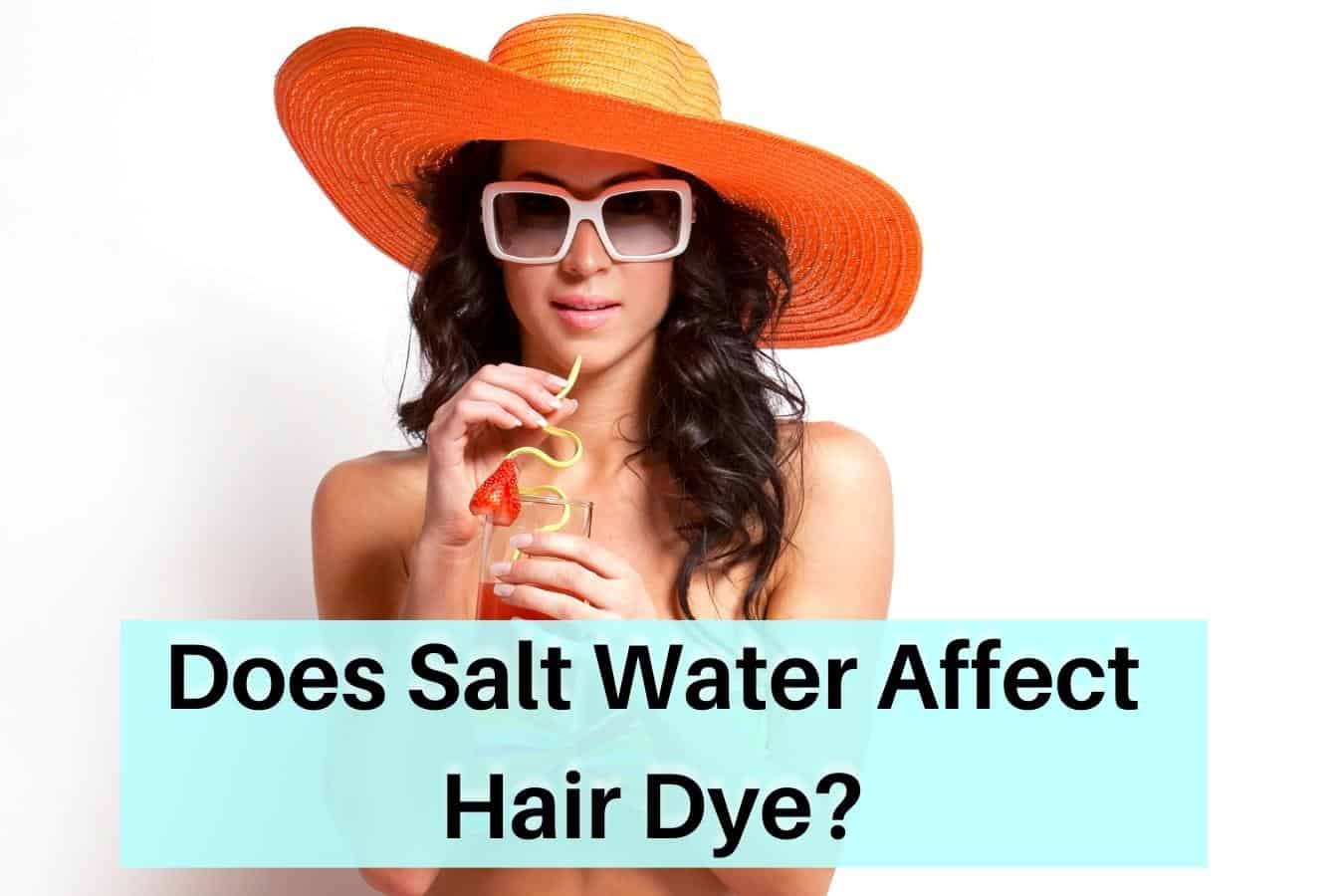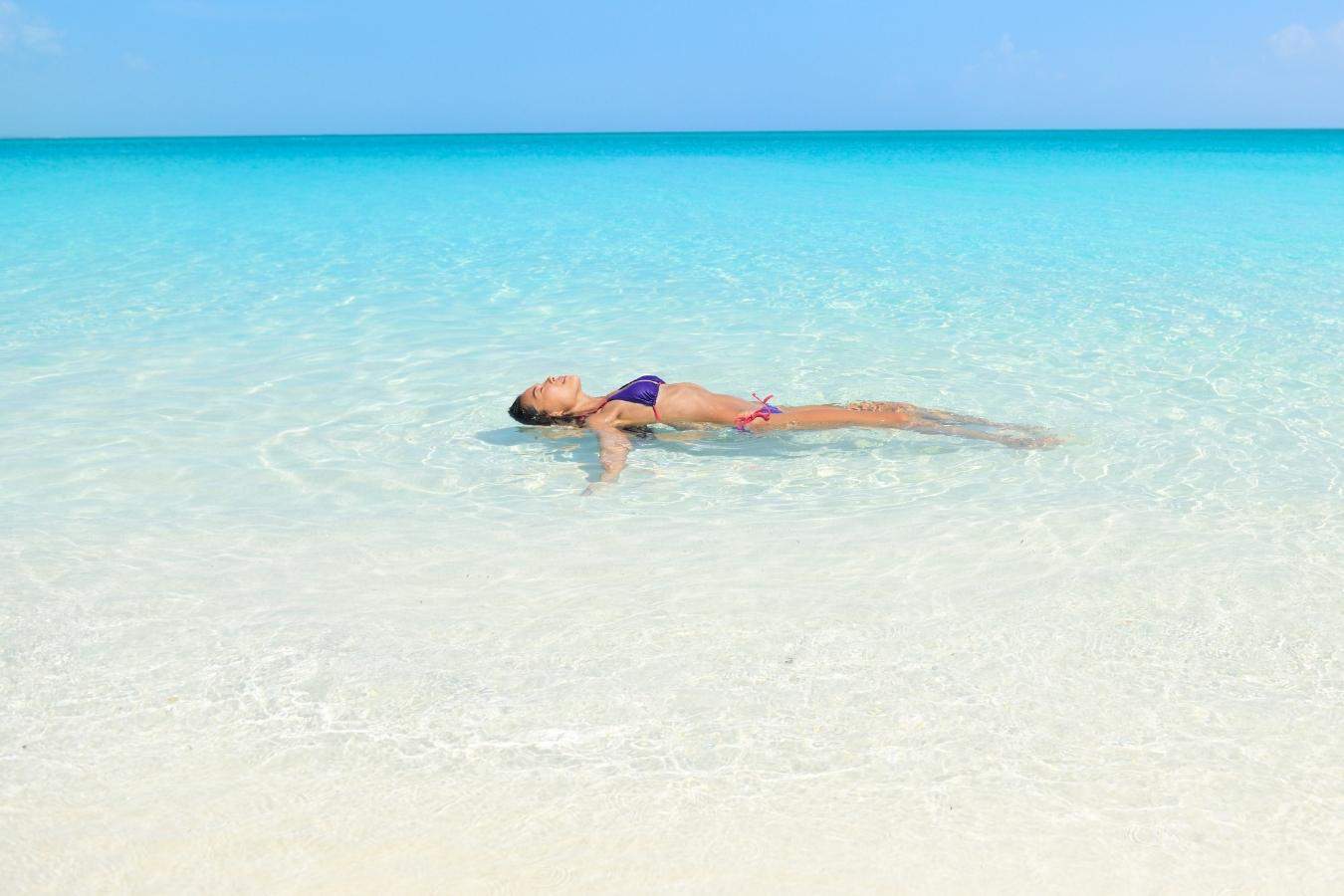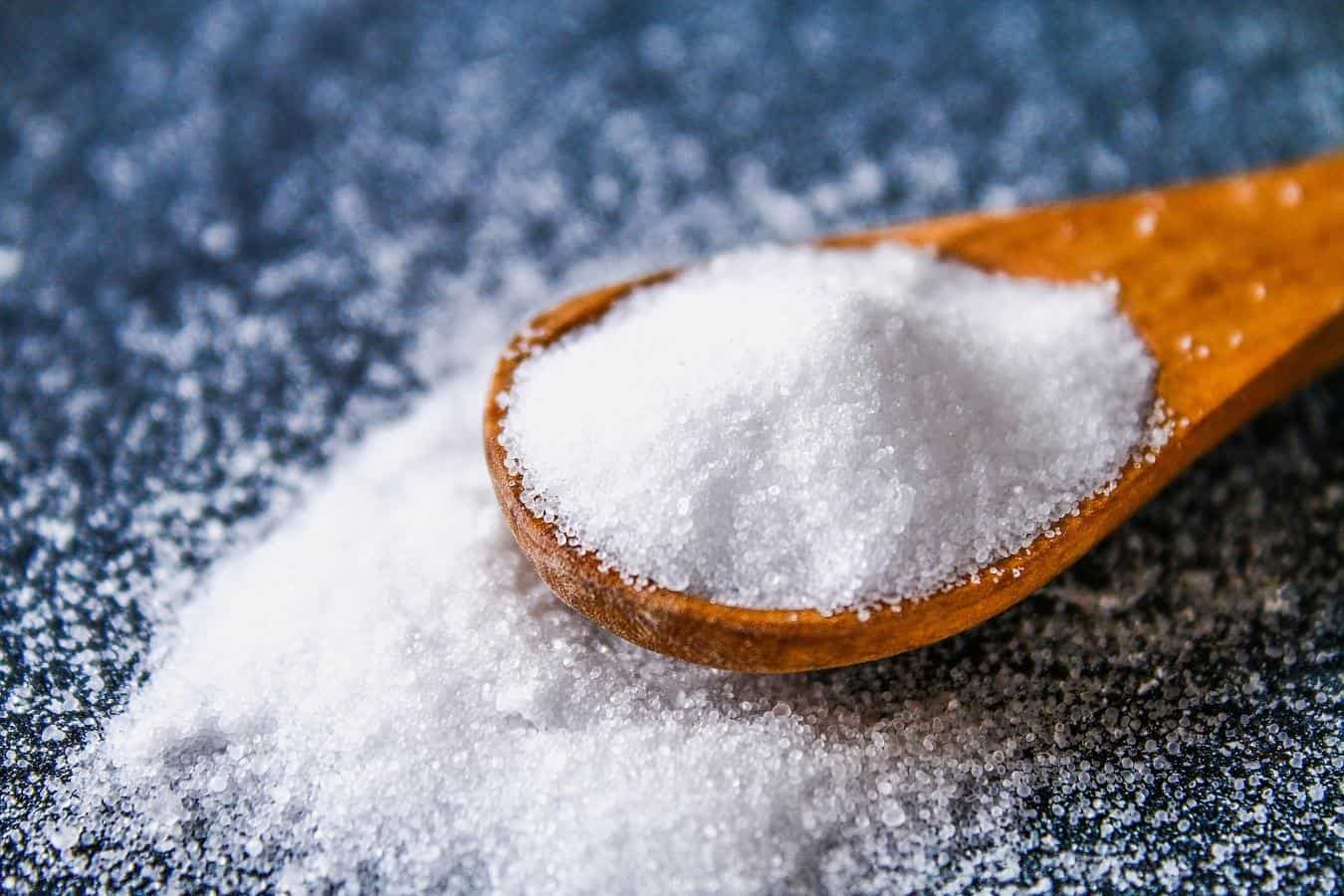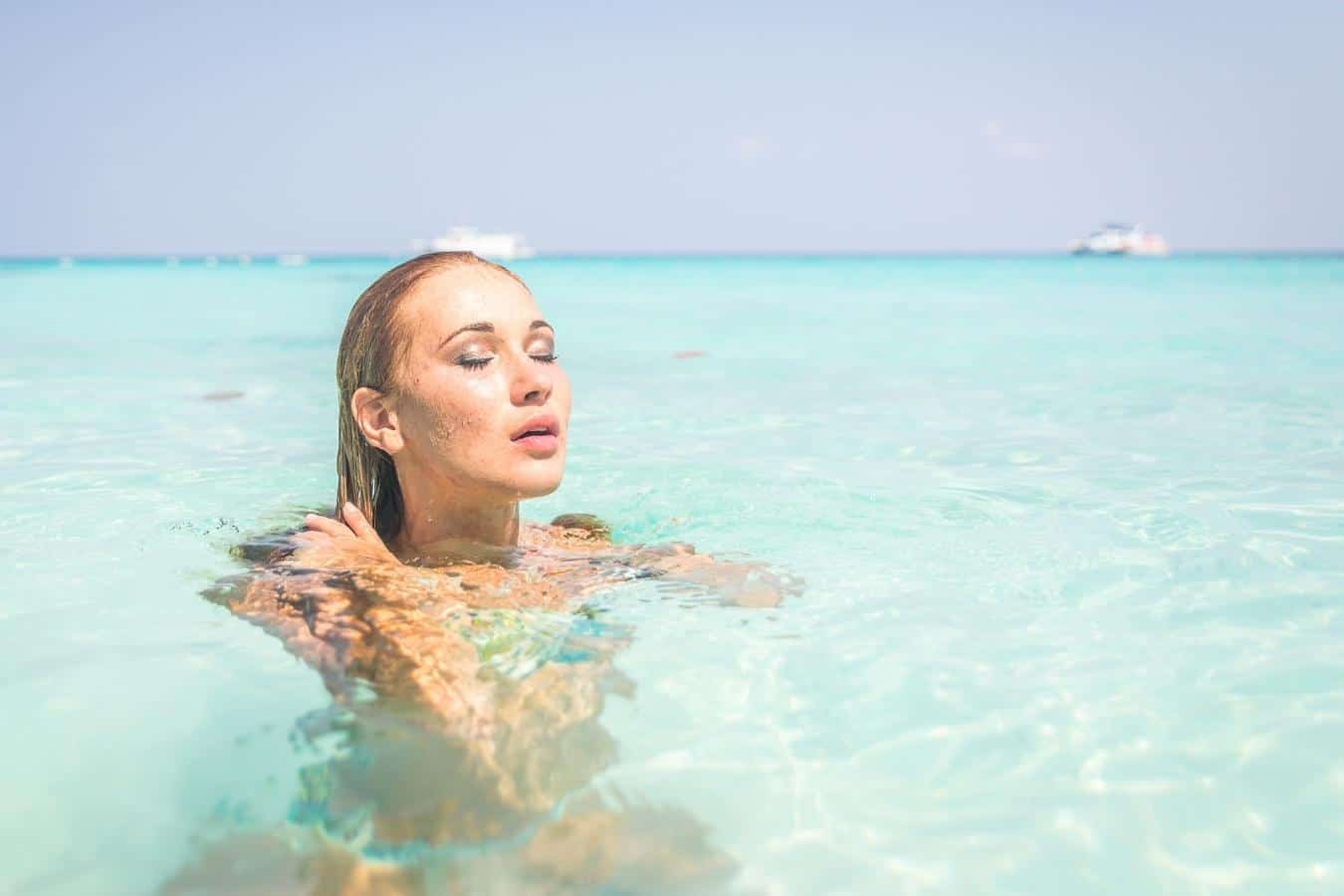Are you wondering how salt water affects hair dye? While salt water can be beneficial to your hair, it can also be damaging, especially if your hair was recently dyed. You don’t have to avoid the ocean to keep your hair safe, but you should learn more about the effect salt water can have on your locks.

Is Salt Water Bad For Your Hair?
Salt water can dry out your hair, making it brittle and vulnerable to breakage. (1)
Since permanent hair dyes can also deplete moisture from hair, exposing color-treated hair to salt water can cause serious damage. In addition, salt water can also cause your color to fade.
When salt crystals cling to your hair, they’ll gradually leach away moisture. The longer it stays on your hair, the more moisture you’ll lose.
If your hair is soaked in salt water, it’s best to rinse it out quickly to prevent damage.
Not only can salt water remove faded hair dye, but it can even cause your natural hair color to fade. Like permanent hair dyes, salt water can penetrate your hair shaft, stripping away color.
While it won’t instantly change your hair, you’ll gradually see your hair get lighter if you swim in the ocean on a regular basis.
Thankfully, most of this damage can be prevented. If you wet your hair in fresh water before you swim in salt water, salt crystals won’t be able to penetrate your hair.
You can also protect your hair by applying a moisturizing leave-in condition.
In fact, if you take a few precautions and use salt water in the right way, it can actually improve your hair’s health. Salt water can benefit your tresses and your scalp in a number of ways.
What Are The Benefits Of Salt Water For Hair?

- It exfoliates the scalp, stimulating blood flow and sending more nutrients to your hair follicles
- It’s packed with nutrients like selenium, magnesium, and potassium
- It has antifungal and antibiotic properties, making it an effective natural treatment for dandruff
- It can shampoo your hair and strip away heavy oils
- It can add volume to fine hair
- It can remove hair dye you’re not happy with
How Does Salt Water Affect Hair Dye?
Permanent hair dye opens up the hair cuticle, allowing you to replace your natural hair color with a pigment of your choice.
Salt water can have a similar effect on your hair. Salt crystals can penetrate hair strands, stripping away hair dye without replacing it with a new color.
In addition to stripping and fading your color, salt water can make your hair less vibrant. If you expose your dyed hair to salt water, it may start to look dull.
Whether you’ve used a permanent dye or something semi-permanent, salt water can dramatically change the color of your hair.
Salt water can also exacerbate the damage that hair dye causes to hair. Dying your hair can be damaging, especially if you use bleach.
Chemical dyes can remove moisture from your hair, leaving it much drier than usual.
Since salt water also dries out hair, it can make dried-out hair extremely brittle.
While you should always be careful when swimming in salt water, you’ll want to show extra caution if you have color-treated hair.
Should You Avoid Swimming After Having Your Hair Dyed?

A swim is a great way to cool off and get exercise, but you should consider your hair before you hop in the water.
Swimming in the ocean can be risky for dyed hair, but swimming in a pool can cause even more damage. Chlorine can bond with artificial hair color, causing the color to fade dramatically. (2)
You don’t have to give up swimming if you recently dyed your hair, but you should take extra measures to keep your hair healthy and your color intact.
Make sure that you wet your hair with fresh water before you go swimming so that the salt crystals can’t penetrate your hair shaft.
While your hair is still damp, apply a leave-in conditioner that will infuse your hair with extra moisture.
Leave-in products will also coat your hair strands and provide them with extra protection, effectively shielding them from damage.
Some leave-in conditioners offer UV protection as well!
Can Salt Water Completely Strip Hair Color?
It’s important to make sure your hair is protected from salt water if you’re happy with your hair color, but you can use salt water to remove hair dye you don’t like.
Soaking your hair in the ocean will gradually remove hair color, especially if you follow it up with a clarifying shampoo.
However, you should be aware that salt water exposure can lighten your natural hair color as well.
If you’re looking for a way to remove hair dye at home, you can strip away color with a salty shampoo.
Try mixing Epsom salt, baking soda, and water to create a paste that can open up your hair shaft and get rid of the color that you want to remove.
The longer you leave the mixture on, the more color it will strip away.
Whether you use the ocean or a salt shampoo, it takes time to fully strip hair color. You can speed up the process by letting your hair air dry in the sun.
Since salt water can dry out your hair, you should use a hair mask to infuse your hair with extra moisture at least once each week.
How To Best Manage Recently Dyed Hair

In addition to being cautious around salt water, you’ll want to take a few additional steps to keep your color-treated hair safe.
If you take a few extra precautions, you can keep your color vibrant for longer.
Use a Color-Safe Shampoo
Many shampoos strip away hair dye, causing hair color to fade quickly.
Even permanent color won’t last forever, but you can buy yourself some extra time if you switch to a shampoo that’s designed for color-treated hair.
Try to avoid products that contain sulfates. Don’t use a clarifying shampoo on your hair until you’re ready to dye it again.
You may want to skip the shampoo on occasion and use conditioner on your hair instead.
Wash Your Hair Less Often
The less you wash your hair, the longer your color will last. Most people don’t need to wash their hair on a daily basis in order to keep it clean.
If possible, try to limit yourself to washing your hair two or three times a week.
If you notice that your hair looks greasy between washes, you can make it look clean again with a dry shampoo.
The dry shampoo will refresh your hair and absorb excess oils in the scalp. Using a dry shampoo can also add volume to your locks!
Give Your Locks Plenty of Hydration
Since hair dry takes moisture away from your hair, you’ll want to make sure you get back the moisture that you’ve lost.
Pick an ultra-hydrating conditioner to use in the shower. Once your hair is clean, apply a leave-in conditioner that will moisturize your hair and shield it from damage.
You should also aim to use a hair mask once or twice a week. Hair masks are a way to deep condition your hair, repairing damage and adding extra shine.
Some hair masks can even deposit color on your locks!
Protect Your Hair from Heat
High levels of heat can be damaging to hair, which can make any damage caused by hair dye worse.
Skipping the blow-dryer is a great way to keep color-treated hair safe, but if you’d prefer not to air dry your locks, you’ll need to make sure your hair has the protection it needs.
While your hair is wet, apply a heat-protecting product to your strands. Make sure that you don’t use any heat-styling tools until your hair is completely dry.
References
(1) To Evaluate and Compare Changes in Baseline Strength of Hairs after Treating them with Deionized Water and Hard Water and its Role in Hair Breakage
https://www.ncbi.nlm.nih.gov/pmc/articles/PMC6028999/
(2) Hair color damages caused by exposure to chlorinated water in the presence of ultraviolet radiation
https://www.researchgate.net/publication/236109930_Hair_color_damages_caused_by_exposure_to_chlorinated_water_in_the_presence_of_ultraviolet_radiation
Disclaimer: This site is not intended to provide professional or medical advice. All of the content on LovedByCurls.com is for informational purposes only. All advice should be followed at your own discretion. Ingredients may change at any time so always check the product label before using. Check our full disclaimer policy here.
